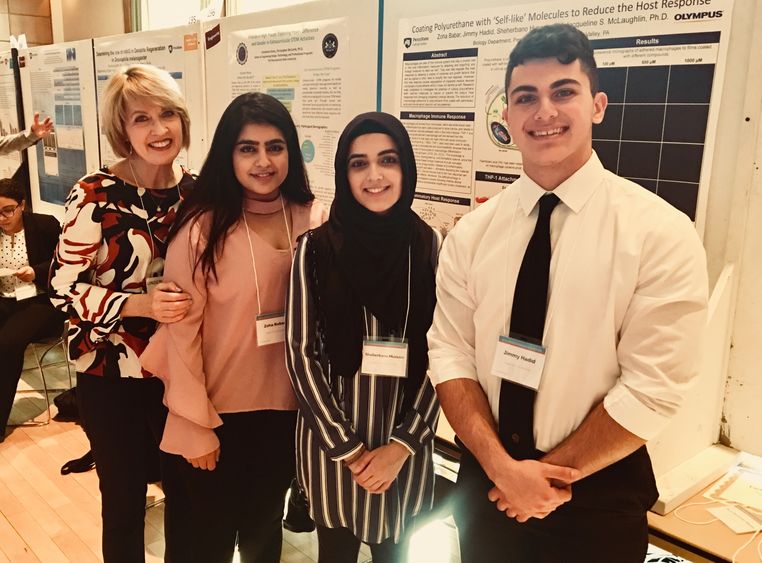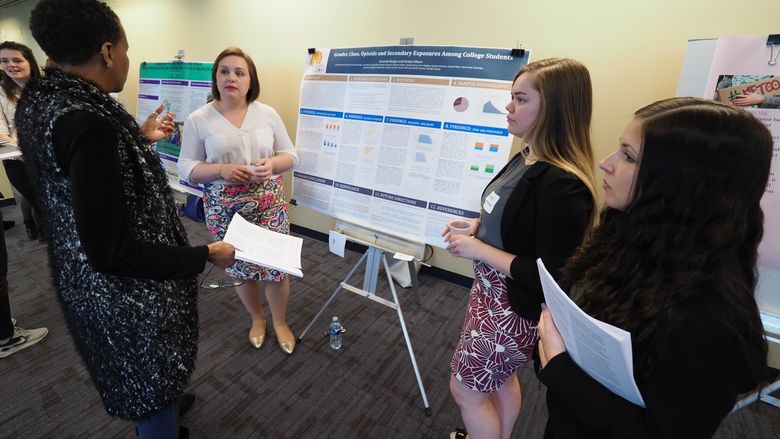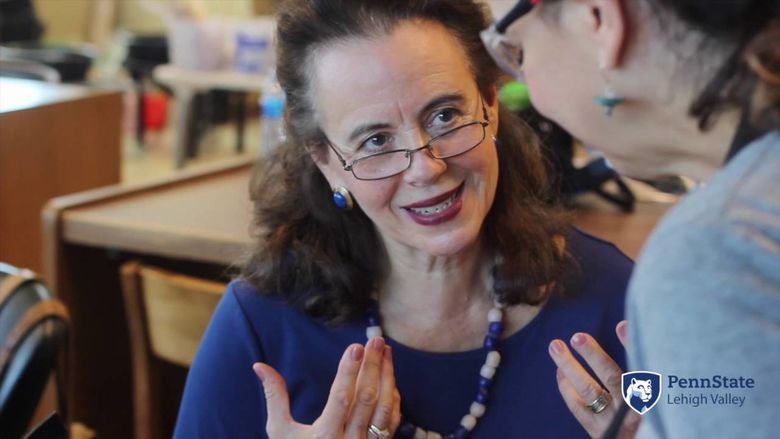
Penn State Lehigh Valley students Zoha Babar, Sheherbano Hussain and Jimmy Hadid, and Associate Professor of Biology Jacqueline S. McLaughlin, gathered in front of their poster titled, "The Potential of Coating Polyurethane with ‘Self-like’ Molecules to Reduce the Host Response to Implanted Medical Devices." They took second place in the Biological Sciences and Health category at the Penn State Eastern Regional Undergraduate Research Symposium at Penn State Abington on April 21. Their poster was also presented at the 2018 Undergraduate Research Exhibition in University Park.
CENTER VALLEY, Pa. — As a prominent research institution, Penn State emphasizes the value of research. Penn State Lehigh Valley students have the opportunity to work with esteemed faculty members to complete research at the undergraduate level. Students have ample opportunities to present their research and findings at conferences and regional symposiums. This year some student researchers were also published in peer-reviewed academic journals.
The students from Penn State Lehigh Valley who had their undergraduate research accepted for publication or who presented their research between May 2017 to April 2018 include:
Poster presentations:
— "Implementing Urban Green Agriculture in Cuba to Increase Food Production and Reduce Fossil Fuel Dependency." Alexandra Roque (class of 2017, biology) and Hannah Albright (class of 2018, environmental resource management – soils); Jacqueline S. McLaughlin, associate professor of biology. Poster presented at the 2018 Undergraduate Research Exhibition, University Park, April 2018.
— "Developing Effective Policies for Conserving Mangrove Forests in Cuba." Erifili Draklellis (class of 2018, earth science and policy) and Tianna Fredericks (class of 2019, microbiology); Jacqueline S. McLaughlin, associate professor of biology. Poster presented at the 2018 Undergraduate Research Exhibition, University Park, April 2018.
— "Exploring the Economic Utilization of Invasive Species to Improve the Health of Select Ecosystems in Cuba.” Ethan Liu (class of 2018, microbiology) and Logan Staley (class of 2018, landscape architecture); Jacqueline S. McLaughlin, associate professor of biology. Poster presented and won the Gerard A. Hauser Award for Best Overall Exhibit Presentation (Grand Prize) at the 2018 Undergraduate Research Exhibition, University Park, April 2018.
— “Spectrophotometric Fluorescence and Isothermal Titration Calorimetry Used to Determine the Binding Affinity of Flavins with Riboflavin Binding Protein and Computationally Calculated Estimated Binding Energy.” Habib Yazgi (class of 2018, biology) and Noorhaan Abouomar (class of 2018, biochemistry); Julie Ealy, associate professor of chemistry. Poster presented at the Middle Atlantic Regional Meeting, American Chemical Society, Hershey, Pennsylvania, July 2017.
— “iCS: iPad Apps for Introductory Computer Science.” Jacqueline Tran (class of 2019, computer science); Jeffrey A. Stone, assistant professor of information sciences and technology. This research involved the creation of custom iPad apps for use in learning introductory computer programming concepts. Poster presented at the Penn State Eastern Regional Undergraduate Research Symposium at Penn State Abington, April 2018.
— “Variations in Airglow Temperature Influenced by the Increasing of CO2, Solar Cycle Variation and Geomagnetic Activity.” Michael Vanyo, (class of 2020, physics); Tai-Yin Huang, professor of physics. Student used satellite and ground based temperature measurements to deduce solar and geomagnetic activity trends in the data and made comparisons to model simulations. Poster presented at the Penn State Eastern Regional Undergraduate Research Symposium at Penn State Abington in April 2018. The work will also be presented at a Trends workshop in China in May.
— "Coral Reef Preservation in the United States and Cuba: Solidarity versus Alliance." Orli Glickman (class of 2018, biology) and Casey Carr (class of 2018, biology); Jacqueline S. McLaughlin, associate professor of biology. Poster presented at the 2018 Undergraduate Research Exhibition, University Park, April 2018.
— "The Potential of Coating Polyurethane with ‘Self-like’ Molecules to Reduce the Host Response to Implanted Medical Devices." Sheherbano Hussain (class of 2020, biochemistry), Zoha Babar (class of 2020, biology) and Jimmy Hadid (class of 2020, biology); Jacqueline S. McLaughlin, associate professor of biology. Poster presented at the 2018 Undergraduate Research Exhibition, University Park, April 2018. Poster also presented and took second place in the Biological Sciences and Health category at the Penn State Eastern Regional Undergraduate Research Symposium at Penn State Abington, April 2018.
Presentations:
— “Drug Assessment and Secondary Exposures Among College Students," by Stephanie Bernal (class of 2017, health policy administration [HPA]), Amanda Borges (class of 2018, HPA), Theodore Carbonetto (class of 2018, HPA), Shanice Clarke (class of 2018, HPA), Crystal Henry (class of 2018, HPA), Erica Hughes (class of 2019, HPA), Kirsten Mears (class of 2018, HPA), Chancia Moore (class of 2019, HPA), Rackel Nderia (class of 2018, HPA), Kena Patel (class of 2017, HPA), Nairobys Ramirez (class of 2017, HPA), Matthew Rohrbach (class of 2018, HPA), Colleen Sculley (class of 2018, HPA); Tucker Zulli (class of 2017, HPA), Jennifer Parker, associate professor of sociology).
This study help fills a local knowledge gap concerning university students’ awareness of and exposures to the drug epidemic. The study followed a self-administered quantitative research design and employed content analysis and SPSS statistical software to analyze the results. Results were presented to officials at the Lehigh County Department of Health.
— “Healthy Aging and Older Americans: A Focus on the Perspectives of those 65 Years and Older," by Victoria Carsia (class of 2020, HPA), Sean Graver (class of 2020, HPA), Emily Holder (class of 2020, HPA), Mathew Limuel Jordan (class of 2020, HPA), Jasdip Kaur (class of 2019, HPA), Trisha Mukherjee (class of 2018, HPA), Midhat Rehman (class of 2019, HPA), Lysandra Santos (class of 2019, HPA), Hailey Vigilotti (class of 2020, HPA); Jennifer Parker, associate professor of sociology.
The intention of this study was to bring out the voices of older Americans and shed light on their perspectives in three key areas: concepts of healthy living, challenges faced in living healthy, and insight for future generations. A qualitative research design was employed. Face-to-face in-depth semi-structured interviews were conducted with 13 people over the age of 65 living in an independent living facility in a small Northeastern town. A research report and sociological analysis were presented to a local independent living facility.
Thesis:
— Eric Oh (class of 2018, finance), "Phase 4 Private Equity Development: Reshaping Buyout Industry Dynamics and Review of Ethics.” Mark Gruskin, assistant professor of finance and accounting, served as Oh's thesis supervisor. Thesis approved by the Schreyer Honors College, April 2018.
— Habib Yazgi (class of 2018, biology), “Binding Affinities of Flavins to Riboflavin Binding Protein Using Fluorescence Spectrometry and Isothermal Titration Calorimetry, and Estimated Binding Energies Using Computation Approaches.” Julie Ealy, associate professor of chemistry, served as the thesis supervisor and mentor for two years of research with Habib, a Schreyer Scholar, and Noorhaan Abouomar. The thesis was submitted and approved April 11 in partial fulfillment of the requirements for a baccalaureate degree in biology with honors in biology. Riboflavin binding protein is specific for transporting riboflavin from the human mother to the fetus during pregnancy. This protein is a highly conserved protein and is found in different species; this supports its importance in sustaining the development of the fetus. Elevation of riboflavin binding protein (RBP) has been associated with breast cancer in women. This elevation suggests that it might be a good biomarker to detect early breast cancer. Recently, riboflavin binding protein (RBP) antisera has been observed to cause riboflavin depletion in the human cervical cancer cell line (HeLa). This observation suggests that RBP can be a point of intervention for therapeutic drugs against cancer.
Research accepted for publication:
— Student co-authors Noorhaan Abouomar (class of 2018, biochemistry), Justin Cogan (class of 2018, biochemistry), Paolo Flauta (class of 2016, biology), Liliana Nassar (class of 2016, biology with a psychology minor), Matthew Mekolochik (class of 2016, biology), Sarah Ramzy (class of 2017, chemical engineering), Christopher Shannon (class of 2017, chemical engineering), and Habib Yazgi (class of 2018, biology). Julie Ealy, associate professor of chemistry, served as the faculty mentor of the eight students for the research that required five years.
As of 2015, there are approximately 39,515 new HIV infections each year in the United States. Thus, interventions are needed to prevent transmission to those who are uninfected, and optimized treatment is necessary for those who are already infected. The development of new drugs that can prevent transmission as well as disease progression is of paramount public health importance, and targeting a critical viral enzyme such as HIV-1 integrase is a proven approach to meet this need, said the research. The research, “Estimated Binding Energies of Drug-like and Nondrug-like Molecules in the Active Site of HIV-1 Integrase, 1BIS.pdb, and Mutated 1BIS.pdb," appears in Advances in Bioscience and Biotechnology, 8, online at the Scientific Research website.
Dennille Schuler
Public Relations Specialist
Penn State Lehigh Valley



